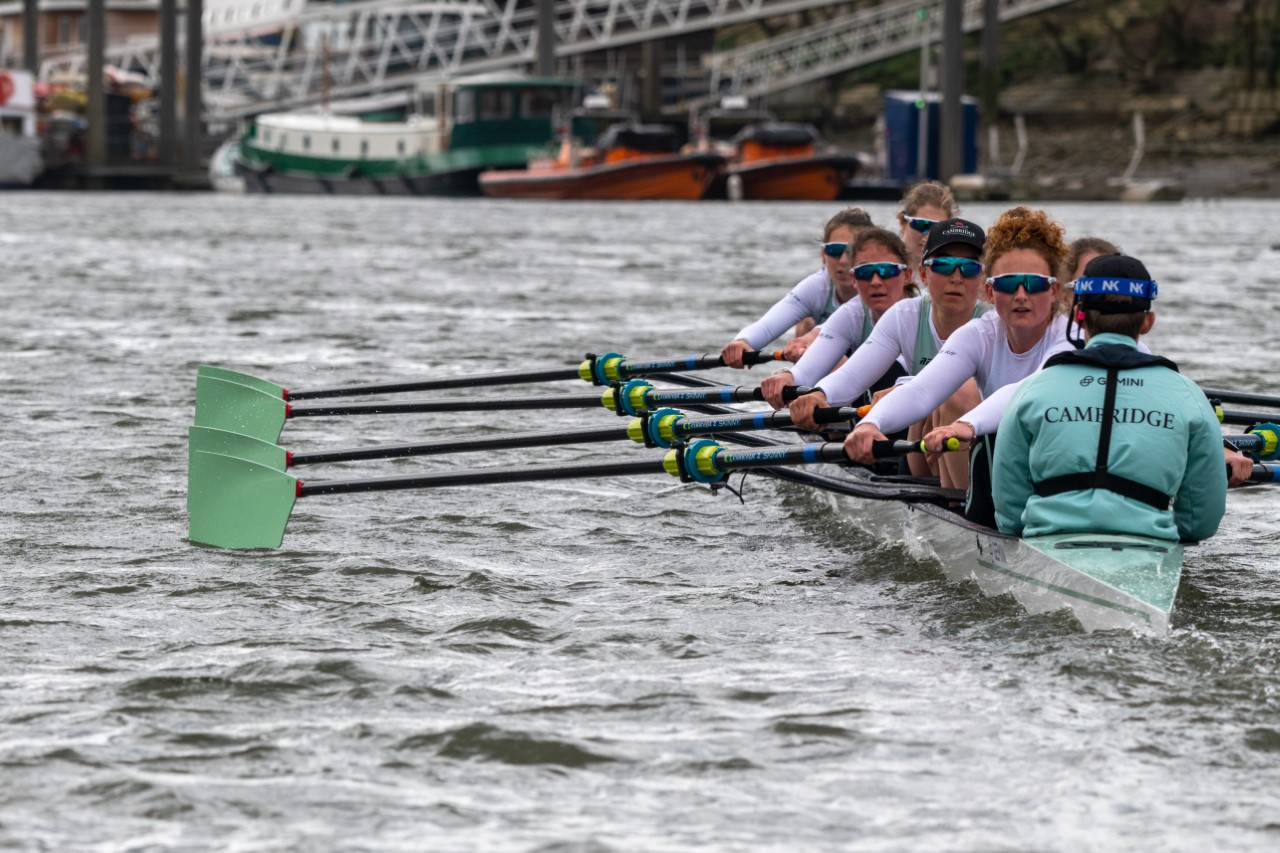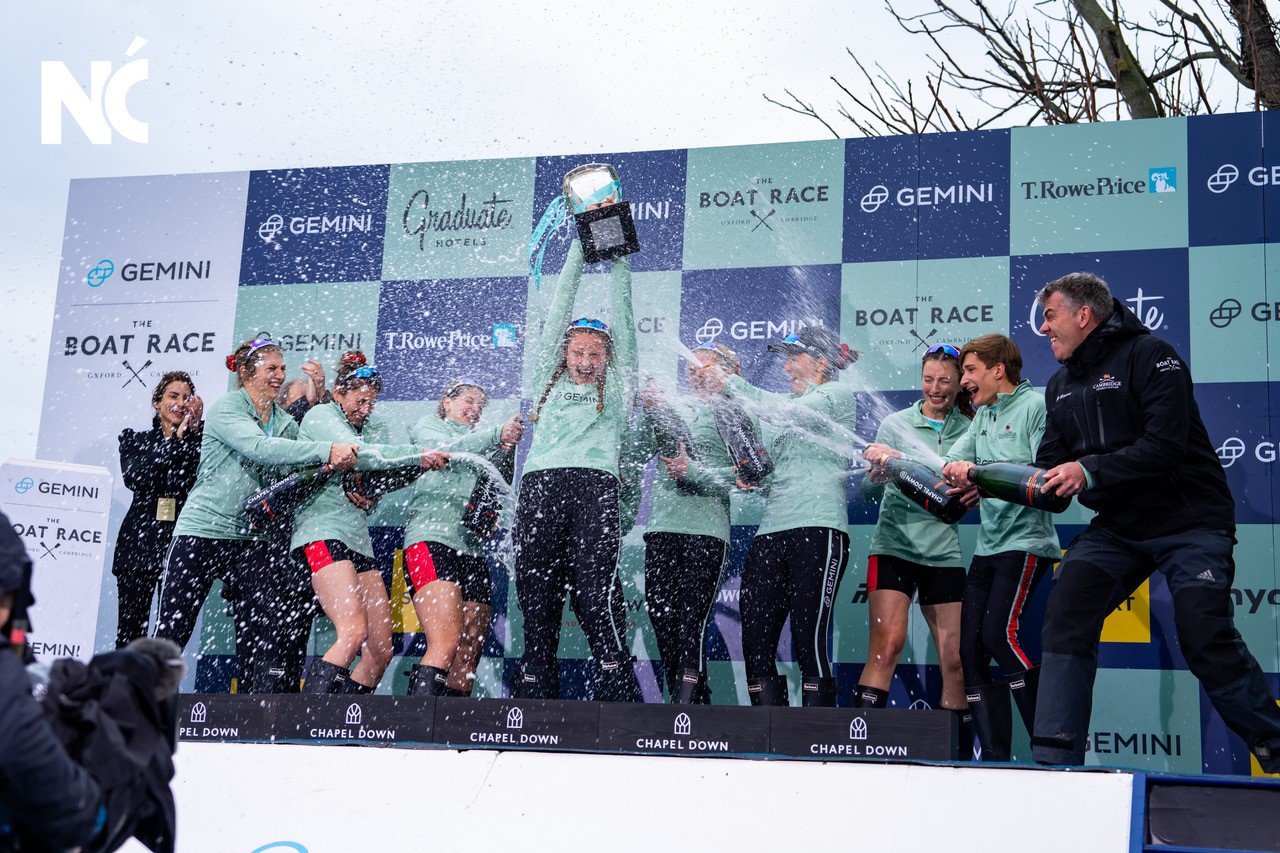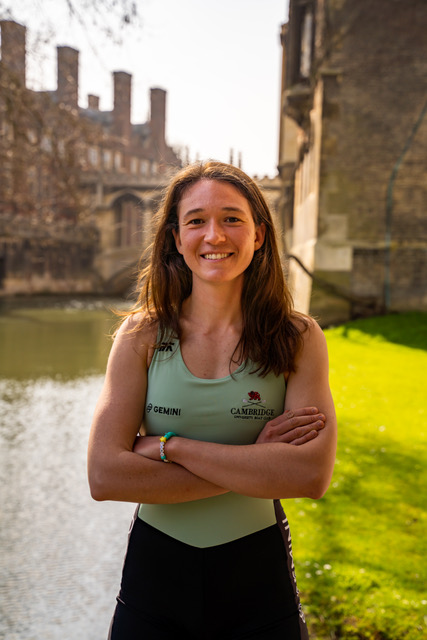
Jenna Armstrong on her PhD and on being part of the winning Cambridge women's rowing team
The team relationship is unlike any other I have had. Rowing is challenging physically and mentally, but we are doing it together.
Jenna Armstrong
Jenna Armstrong is feeling a mixture of pure joy and relief. She is one of this year’s winning Cambridge women’s rowing team. The elation follows months of gruelling training every morning and evening.
Jenna [2020] started rowing in 2011 as an undergraduate, but took five years off from 2015 to 2020 until she picked it up again when she started at Cambridge. She turned to rowing after she was forced to give up a promising career as an alpine skier when she suffered a bad knee injury at the age of 14. She had felt a bit lost without competitive sport and rowing offered not only exercise but also the support of a team. She took to it instantly.
 At Cambridge she was in the women’s reserve team, Blondie, last year. To be selected for both the reserve and the main team athletes are tested using telemetry to see what they are producing with every stroke on the water and also on indoor rowing machines. This year the final team of eight was whittled down from 56 athletes.
At Cambridge she was in the women’s reserve team, Blondie, last year. To be selected for both the reserve and the main team athletes are tested using telemetry to see what they are producing with every stroke on the water and also on indoor rowing machines. This year the final team of eight was whittled down from 56 athletes.
Jenna says the sense of team spirit is what she values most about rowing: “The team relationship is unlike any other I have had. Rowing is challenging physically and mentally, but we are doing it together. Everyone wants the same outcome and we need each other to achieve that.”
This year’s victory was even sweeter because it saw a clean sweep for Cambridge across all the rowing teams.
Jenna is very aware of the history behind the Oxford Cambridge race. The boathouse where she does her indoor training has been there for hundreds of years and has plaques from all the races on its walls. The Ely boathouse where the team do their on-water training lists every single crew that has taken part in the boat race and is the scene of many reunions. Recently the 1973 women’s team visited the current women’s crew.
Early years and studies
Jenna has always been sporty. Born in New Jersey, she started skiing when she was just one and a half, her parents having met through skiing. “I had no choice,” she smiles. By the age of eight Jenna was skiing competitively and really enjoying it. Her father took her up and down the east coast to competitions. She missed quite a bit of school, but her guidance counsellor and fellow students were very supportive and she was able to catch up on her school work. When she had her accident at 14, it was a scary and worrying time for Jenna. She had to go through two surgical operations and years of intensive physical therapy.
Since she was a young child, Jenna has wanted to be a doctor. After high school, where she also excelled in other sports including soccer and volleyball, she went straight to Bates College in Maine to do her undergraduate pre-med course in biological chemistry and maths.
 She chose Bates College due to its reputation for skiing, but in fact it turned out that it had one of the best rowing programmes in the country. When she started her degree Jenna thought she might eventually return to skiing, but it soon became apparent that that wasn’t going to happen. The rowing team helped her to recover from that disappointment.
She chose Bates College due to its reputation for skiing, but in fact it turned out that it had one of the best rowing programmes in the country. When she started her degree Jenna thought she might eventually return to skiing, but it soon became apparent that that wasn’t going to happen. The rowing team helped her to recover from that disappointment.
During her course, Jenna did several internships – one focused on cancer care and another on osteoporosis and endocrinology. After her degree she took two years out of academia as she prepared to apply to medical school during which she worked for Teach America as a high-school maths teacher in rural Washington State and did a master’s in education. After that Jenna took up a fellowship to work in a rural hospital in India with an innovative, community-centred approach to health. The hospital trained lower caste local women to deliver basic healthcare. “It was an amazing learning opportunity to work in the hospital and with visiting international aid teams,” says Jenna.
Cambridge
She returned to start her medical training at Duke University on an MD/PhD programme. She applied to Cambridge in her first year after discovering the work of Dr Andrew Murray on the Sherpa population on Everest. He was looking at how they adapted physically to high altitudes. “I thought it was the coolest thing in the world,” says Jenna. “I had been an athlete my whole life and had spent a lot of time as a skier at high altitudes. The research on physical and genetic adaptation to high altitudes brought together several of my interests.”
Jenna is now in her third year and, due to Covid restrictions, her research focus has switched from the skeleto-muscular health of Sherpas to the impact of high altitudes on placental function in Bolivians women living at high altitudes. This aligns well with Jenna’s plans for a future medical specialism in obstetrics and gynaecology. She is comparing placenta function at high altitudes in mostly European populations and those in Bolivia. Jenna says the babies of European women who live at high altitude tend to be smaller and the hypothesis is that the metabolism in the placenta plays a part. By understanding the pathway that affects growth women can be given drugs that ensure they have healthier babies.
Now that the Oxbridge race is over, Jenna is looking forward to throwing herself into her PhD work, but she hopes to compete again for Cambridge next year – her final one at the university – and to help her team continue their winning streak.
*Picture credits: Individual headshot and photo of the winners celebrating by Nordin Catic. Top photo by Vicky Gillard.












